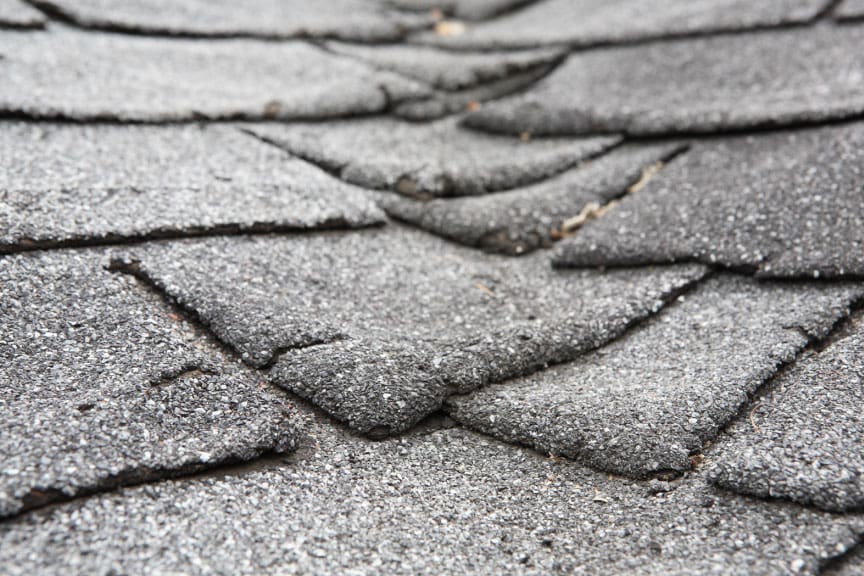1) Heat leads to Cracking, Curling, and Wrapping.
Here in Virginia Beach, summer temperatures can rise to a scorching 100 degrees Fahrenheit, or more! That’s fine if you have a pool, a cool drink, or a beach day planned. But the heat takes a toll on your shingles.
Asphalt shingles can reach temperatures of 150 degrees Fahrenheit or higher! Your roof can get hotter than the surrounding air due to prolonged exposure. Asphalt shingles absorb that heat all day long, causing them to crack, curl, or warp.
While shingles are designed to withstand the elements, Virginia’s intense summers accelerate their deterioration. We’ve seen this firsthand as your roofing company in Virginia Beach. Prolonged heat makes shingles brittle, making them more likely to break or let water in.

2) Thermal Expansion can stress the Entire Structure of your Roof.
Have you ever had a summer cold? It’s sweltering outside, but inside the A/C is cranked to the coldest possible setting. Dramatically switching between hot and cold weakens our immune system, making us more susceptible to common viruses.
Your roof goes through a similar thing, but with thermal expansion. Materials expand under heat, think of how water expands into gas when boiled. Your roof’s shingles, flashing, and underlying structure expand with the hot summer days.
But at night, when things cool down to the low 70s, they shrink. Over time, this expanding and contracting leads to gaps, misalignments, cracks, and even splits. The metal flashing around your chimney or vents can peel away. Shingles can split. And the wooden decking underneath can warp. All of these minor issues make you much more susceptible to leaks.
3) Humidity Leads to Moisture, Which Leads to Mold, Mildew, and Rot.
Since we’re so close to the coast, our summers are more humid than inland areas. High humidity can lead to condensation within your attic, especially in poorly ventilated attics.
If the air doesn’t circulate, meaning it doesn’t circulate from the inside back to the outside, that moisture’s trapped. And a lot of bad things love moisture.
Mold can grow in your attic. And in the worst-case scenario, mold spores can circulate within your own A/C system, making you sick.
Wood can rot, threatening the integrity of your home. Termites and carpenter ants can infest your attic, leaving you with a very expensive pest control bill.

4) Frequent Storms and Heavy Winds
As roofing contractors in Virginia Beach, we frequently get called to assess and repair summer damage. Summer storms bring heavy rains and strong winds. If your shingles are already damaged from the heat, then they are easier to blow off. Wind can tear off your shingles, letting the rain into your roof.
Summer storms can also overwhelm your gutters. Debris can clog your gutters, letting the water pool, increasing your chance of a leak.
What can Virginia Beach Homeowners do about these Summer Roofing Problems?
We always recommend regularly scheduling roof inspections so you can catch these issues before they spiral into expensive roof repairs.
If you prefer DIY solutions, then we recommend cleaning your gutters and downspouts. Check inside your attic for any leaks and moisture buildup.
However, if you want to prevent roof repairs in Virginia Beach, then we recommend stronger materials. Higher quality shingles, like modified IR shingles, are designed to withstand extreme weather and can prolong your roof’s life. You can also avoid all the problems that come with shingles by choosing a metal roof. Metal roofs are the most energy-efficient and environmentally friendly roofing material.
The best thing you can do for your home and family is schedule a free, no-obligation roof inspection.
